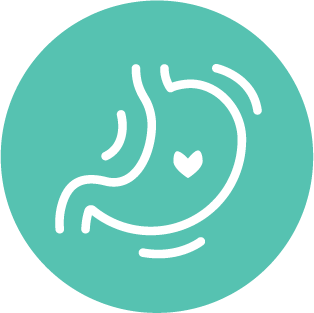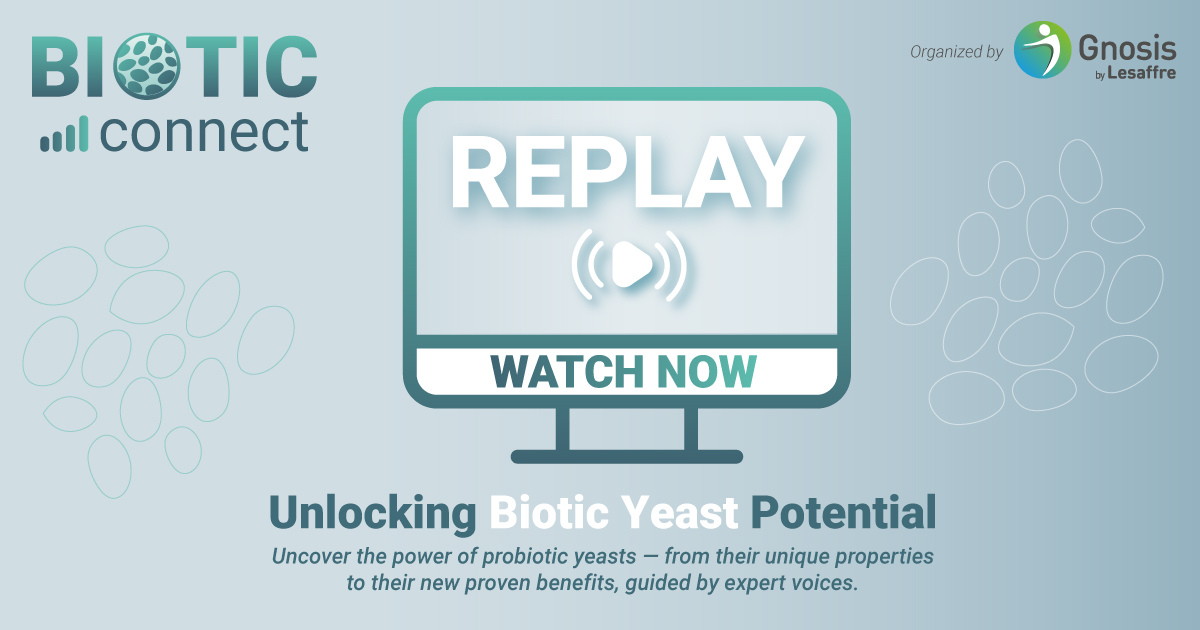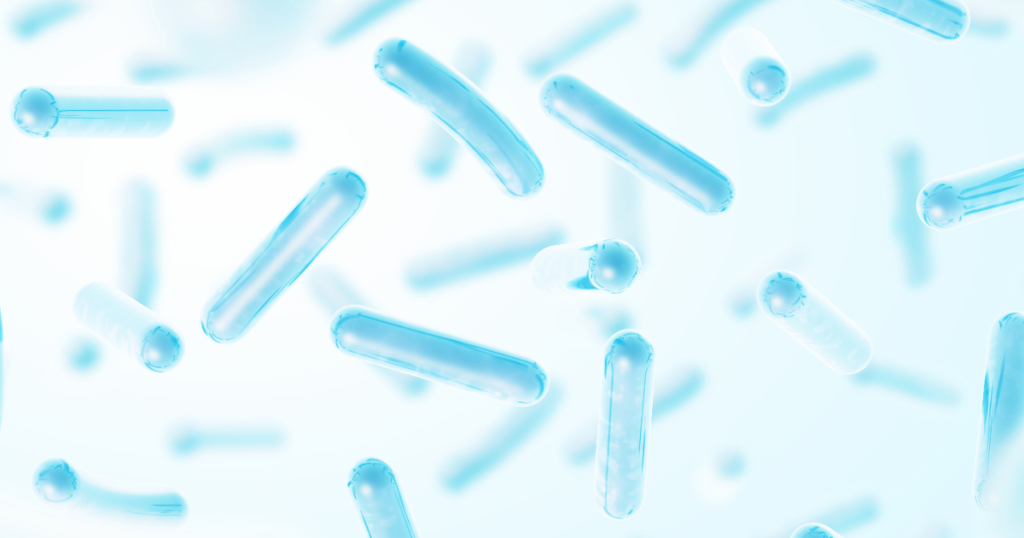Probiotics are live microorganisms that offer health benefits when consumed. Bacillus subtilis is gaining attention for its positive effects on gut health, immune function, and overall well-being.
Bacillus subtilis: Scientific Classification and Background
Bacillus bacteria are Gram-positive, rod-shaped organisms. Under harsh conditions, some strains form protective spores, but this sporulation capacity varies depending on each strain. Bacillus bacteria are primarily soil dwellers but can also be found in water, air, and food products. Bacillus subtilis, along with Bacillus coagulans, is recognized as a probiotic. These bacteria are crucial for maintaining digestive health as part of the normal gut microflora.
Bacillus subtilis stands out for its ability to survive the journey to the intestine by forming spores. These spores resist extreme temperatures, pH levels, and gastric acids, ensuring the bacterium’s survival through the stomach and its activation in the intestine. Additionally, Bacillus subtilis adapts to oxygen-rich and oxygen-poor environments, making it highly effective as a probiotic.
Bacillus subtilis and Gut Health: How Bacillus subtilis Enhances Your Gut Microbiome?
Supporting Gut Health
Bacillus subtilis supports gut health by producing antibiotics that target harmful pathogens while preserving beneficial microbes, thus maintaining a balanced microbiome. It also strengthens the intestinal barrier, reducing the risk of inflammation and inhibiting harmful substances from entering the bloodstream. The benefits of Bacillus subtilis vary by strain, with some strains specifically enhancing gut flora and reducing digestive issues like diarrhea. There are a lot of potential health benefits of Bacillus subtilis probiotic:
Boosting Your Immune System
Bacillus subtilis enhances immunity by increasing sIgA production, stimulating T lymphocytes, and activating macrophages. Some strains, such as Bacillus subtilis CU1, have been shown to reduce respiratory infections and common colds.
Reducing Inflammation
Bacillus subtilis can reduce inflammation by promoting immune markers that regulate the immune system and decreasing those associated with inflammation. It also helps restore the intestinal wall, reducing permeability and stopping pathogens from entering the bloodstream.
How to take Bacillus subtilis for Maximum Benefits?
Bacillus subtilis stands out among probiotics due to its exceptional adaptability and robustness, which facilitate its integration into various dietary supplements. Its spore-forming ability enables it to endure harsh manufacturing conditions such as high temperatures, dehydration or UV radiation. This resilience allows it to remain viable without the strict storage requirements, like refrigeration, needed for many other probiotics. Its spores, resistant to pH changes and digestive enzymes, activate only within the favorable intestinal environment, optimizing the delivery of probiotic benefits. This makes Bacillus subtilis a superior candidate for supplement formulations, ensuring targeted delivery and enhanced stability.
When selecting a Bacillus subtilis supplement, consider factors like stability, strain diversity, and colony-forming unit (CFU) count. It’s crucial to choose a supplement that remains viable through the gastrointestinal tract and is concentrated enough to meet daily dosage recommendations.
Bacillus subtilis is a standout probiotic with the ability to form spores, allowing it to thrive in the harsh conditions of the gastrointestinal journey and effectively colonize the gut. It supports gastrointestinal health, manages chronic digestive problems, boosts immune function, and reduces inflammation, showing promising potential for proactive approaches to healthcare.
- Payne, J.; Bellmer, D.; Jadeja, R.; Muriana, P. The Potential of Bacillus Species as Probiotics in the Food Industry: A Review. Foods 2024, 13, 2444.
- Sorokulova, I. Modern status and perspectives of Bacillus bacteria as probiotics. J. Probiotics Health 2013, 1, 4.
- Suva, Manoj A.; Sureja, Varun P.; Kheni, Dharmesh B.. Novel insight on probiotic Bacillus subtilis: Mechanism of action and clinical applications. Journal of Current Research in Scientific Medicine 2(2):p 65-72, Jul–Dec 2016.
- Williams, N.; Weir, T.L. Spore-Based Probiotic Bacillus subtilis: Current Applications in Humans and Future Perspectives. Fermentation 2024, 10, 78.
Our Other Probiotics:

Lynside® S. boulardii
Biotics
Probiotic Yeast:Doctors and gastroenterologists know its high efficacy and prescribe it for decades to reduce occasional diarrhea and restore gastrointestinal flora.
Digestion & Gut
Wellness & Immune
 Microbiome Balance
Microbiome Balance Diarrhea Management
Diarrhea ManagementImmunity

ibSium®
Biotics
Probiotic Yeast: ibSium® (Saccharomyces cerevisiae CNCM I-3856) is a probiotic yeast clinically proven to support overall intestinal comfort, with more than 96% of consumers reporting a significant improvement of gut comfort.
Digestion & Gut
 Diarrhea Management
Diarrhea Management Digestive Comfort
Digestive Comfort Microbiome Balance
Microbiome Balance

LifeinU® L.rhamnosus GG
Biotics
Probiotic Bacteria: Lactobacillus rhamnosus GG (ATCC 53103) is one of the most studied and best-known probiotic bacteria in the world, with a beneficial effect on digestive health in both children and adults.
Digestion & Gut
Wellness & Immune
Immunity
 Diarrhea Management
Diarrhea Management Microbiome Balance
Microbiome Balance
Latest news

- News
- Quatrefolic®
- Wellness & Immune
- Jun 12, 2025
Webinar Rethinking Women’s Health 24 June 2025
Women's health is complex, constantly evolving, and a broader perspective is long overdue, one...

- News
- Quatrefolic®
- Wellness & Immune
- Jun 09, 2025
Gnosis by Lesaffre Highlights Quatrefolic® at New Nutrition Forum in Hangzhou, China
Gnosis by Lesaffre was proud to serve as the Title Sponsor of the New...

- Corporate
- Digestion & Gut
- News
- Jun 06, 2025
Biotic Live: A Successful First Edition Exploring the Power of Probiotic Yeasts
Gnosis by Lesaffre recently hosted the first edition of Biotic Live, a unique event...






